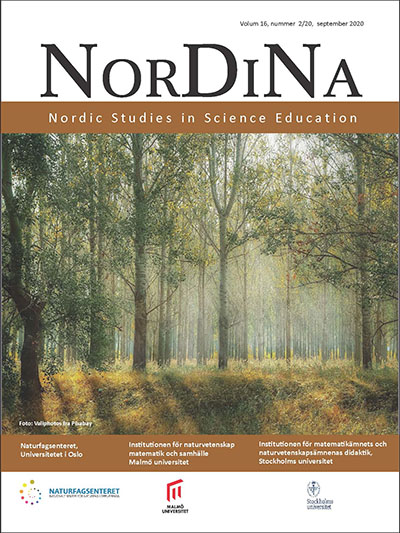- From inclusive practices to personal strategies
Teachers and students designing together digitally supported science learning
DOI:
https://doi.org/10.5617/nordina.8084Sammendrag
The main purpose of this doctoral thesis is to co-design and examine digitally supported inclusive practices in science learning. Inclusive practices aim to provide quality education and quality learning opportunities for all students. Inclusive practices are characterised by process-oriented development that takes into account a student’s personal abilities and needs concerning both knowledge and competencies as well as the classroom context. Since there are very few research-based models for inclusive practices, the longitudinal educational design research (EDR) project aimed to co-design digitally supported inclusive practices at the grassroots level with researchers, teachers and students. The EDR project took place during two years in a medium-sized primary school in the capital region of Finland, where inclusive education was employed as part of teacher collaboration. The participating class (44 students; 10 students with learning difficulties [LD]) had two primary teachers and one special education teacher, the defender of this thesis. The EDR consisted of four macro-cycles, which intended to increase understanding of co-designing and implementing inclusive practices in science learning. The first macro-cycle focused on exploring possibilities for using smartphone technology in a water project. In the second macro-cycle, students used the developed personal solutions and designed collaborative solutions while studying the following science-related themes: forest, human, motions and forces, and space. In the third macro-cycle, students studied Europe and Asia, plants, human and states of matter. The participants developed further both personal solutions and collaborative solutions. Finally, the fourth macro-cycle focused on one science theme, electricity, where solutions were designed for collaborative learning and especially for active participation.
The thesis is comprised of four publications that form a holistic picture of the possibilities of digital technology when considering the adaptation, use and benefits for the student both at the personal and group level. Publication I reports the results of the first macro-cycle of the EDR. Publication II discusses the benefits of using a smartphone in science learning from a student’s personal learning perspective, reflecting all four macro-cycles. Publication III describes the EDR project’s final macro-cycle, electricity project, in which students utilised personal strategies that were supported by the teacher through respectful grouping, differentiated learning tasks and a reflective discussion after lessons. Finally, Publication IV evaluates the development and implementation of the inclusive practises throughout the EDR project from the perspective of the LD students. The data was collected through video recordings of ideating sessions, questionnaires, students’ notes from the e-learning environment, the teacher’s memo and interviews; it was analysed via quantitative analysis of frequencies, qualitative content analysis and co-occurrence network analysis.
As its theoretical contribution, this thesis weaves together the two frameworks of inclusive practices in science learning. First, the digitally supported inclusive science learning supports a student’s personal learning through the differentiation of content, process and product through the use of multimodality. The teacher employs a student’s personal strategies when preparing a collaborative learning project, especially at the levels of process and product. In light of the objective of inclusion, the teacher’s support during the process should aim at giving intensified support and structured guidance in collaborative activities where students require various competences. Second, such a long-term, reflective, co-designing project supports both the use of digital technology and the development of inclusive practices. LD students benefit from a process-oriented, comprehensive, structured and reflective use of technology in their learning. Differences between students’ digital competencies bring a new element to the classroom alongside academic knowledge, both of which affirm LD students’ social status in the classroom. The thesis emphasises that a long-term co-designing project can both develop teaching practices and engage students to develop their personal learning, and hence, promote inclusive education at the grassroots level.
Nedlastinger
Publisert
Utgave
Seksjon
Lisens
Authors who publish with this journal agree to the following terms:- Authors retain copyright and grant the journal right of first publication with the work simultaneously licensed under a Creative Commons Attribution License that allows others to share the work with an acknowledgement of the work's authorship and initial publication in this journal.
- Authors are able to enter into separate, additional contractual arrangements for the non-exclusive distribution of the journal's published version of the work (e.g., post it to an institutional repository or publish it in a book), with an acknowledgement of its initial publication in this journal.
- Authors are permitted and encouraged to post their work online (e.g., in institutional repositories or on their website) prior to and during the submission process, as it can lead to productive exchanges, as well as earlier and greater citation of published work (See The Effect of Open Access).


